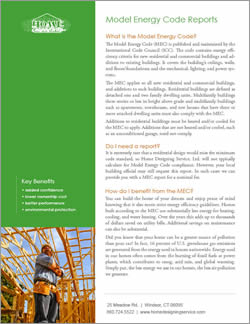Model Energy Code Reports
What is the model energy code?
 The Model Energy Code (MEC) is published and maintained by the International Code Council (ICC). The code contains energy efficiency criteria for new residential and commercial buildings and additions to existing buildings. It covers the buildings ceilings, walls, and floors/foundations and the mechanical, lighting, and power systems.
The Model Energy Code (MEC) is published and maintained by the International Code Council (ICC). The code contains energy efficiency criteria for new residential and commercial buildings and additions to existing buildings. It covers the buildings ceilings, walls, and floors/foundations and the mechanical, lighting, and power systems.
The MEC applies to all new residential and commercial buildings and additions to such buildings. Residential buildings are definded as detached one and two family dwelling units. Multifamily buildings three stories or less in height above grade and multifamily buildings such as apartments, townhouses, and row houses that have three or more attached dwelling units must also comply with the MEC.
Additions to residential buildings must be heated and/or cooled for the MEC to apply. Additions that are not heated and/or cooled, such as an unconditioned garage, need not comply.
Who needs a Model Energy Code report?
It is extremely rare that a residential design would miss the minimum code standard, so Home Designing Service, Ltd. will not typically calculate for Model Energy Code compliance. However, more and more local building officials are requesting this report. In such cases we can provide you with a MEC report for a nominal fee.
How do I benefit from the Model Energy Code?
You can build the home of your dreams and enjoy peace of mind knowing that it also meets strict energy efficiency guidelines. Homes built according to the MEC use substantianlly less energy for heating, cooling, and water heating. Over the years this adds up to thousands of dollars saved on utility bills. Additional savings on maintenance can also be substantial.
Did you know that your home can be a greater source of pollution than your car? In fact, 16 percent of U.S. greenhouse gas emmisions are generated from the energy used in homes nationwide. Energy used in our homes often comes from the burning of fossil fuels at power plants, which contributes to smog, acid rain, and global warming. Simply put, the less energy we use in our homes, the less air pollution we generate.
Key Benefits
- Added confidence
- Lower ownership cost
- Better performance
- Environmental protection

